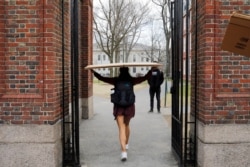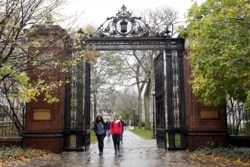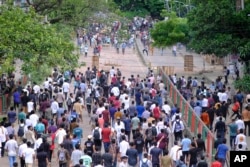Student Union
Universities Try to Keep Students Apart but Together
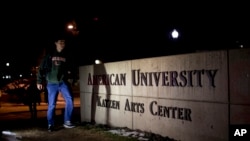
Frank Strong, chancellor of the University of Kansas, made a simple, but official, statement proclaiming the university closed.
“By authority and direction of the state board of health, there will be no classes in the university beginning at noon today, October 8,” he wrote in the university’s paper. “The university will reopen Tuesday, October 15, unless notice is given to the contrary.”
But it wasn’t just one week of closure; it turned out to be five. Strong was dealing with the influenza outbreak of 1918, first discovered in the United States in Haskell County, Kansas, “an isolated and sparsely populated county in the southwest corner of the state.”
More than 100 years later, colleges and universities are dealing with the same health crisis: a flu pandemic that stopped higher education almost overnight. The difference this time is, instead of hundreds of students attending school together, institutions are grappling with how to accommodate hundreds of thousands. That includes more than 1 million students from outside the U.S.
Carlo Ciotoli, M.D., New York University’s associate vice president for student health and executive director of the Student Health Center, is walking in Strong’s shoes. After notifying the NYU community in January 2020 about COVID-19, the disease caused by the coronavirus, people continued to crowd into bars and restaurants, and masks were limited to health care, not streetwear. New York was a hot spot. Students still traveled by plane and mass transit around the planet. States in different parts of the country opened up, then closed when flu rates rose.
Meanwhile, colleges and universities scrambled to respond. Some sent students home for a break, then required them to return to clean out their rooms. Study abroad students were unsure whether to stay or go. Educators, students and parents scrambled to adapt, finally shutting down to figure out how to respond for the fall semester.
So far, 61 percent of schools across the country have decided that students will return to campus.
The dilemma remains: How to keep students safe while not going bankrupt.
On-campus classes
Public and private schools including Harvard University and Boston University in Massachusetts, the College of William and Mary in Virginia, Elon University in North Carolina, the University of North Carolina at Chapel Hill, Kenyon College and Ohio State University in Ohio, Pepperdine University in California, Tulane University in New Orleans, the University of Arizona, and Washington University in St. Louis, all plan on having students on campus, according to the Chronicle for Higher Education, an education news site.
Some universities are starting late, like the University of Florida, while others, like the University of Notre Dame in Indiana, are beginning early, and completing final exams by Thanksgiving.
Other schools, like American University in Washington, D.C., will hold hybrid classes this fall, meaning that course instruction will be online and in person.
For AU, classes that are held in a lab will be given priority for in-person learning, while “more traditional lectures” will follow the hybrid model including a combination of some in-person classes, online work and live streams.
Yale University said it plans to reopen its campus this fall without sophomores, and return in the spring without freshmen, according to its website.
Harvard announced that it will “bring up to 40 percent of undergraduates to campus for the fall semester, including all first-year students,” according to the university’s website.
Princeton University stated that first-year students and juniors will be on campus for the fall, while sophomores and seniors will return in the spring. According to the university’s website, “most academic instruction will remain online.”
Some larger institutions are unable to follow these guidelines, but others, like the University of Colorado at Boulder, are finding unique solutions. CU Boulder plans for students to live and take courses as a group.
“In a regular semester, they may have 40 or 50 different students that they would be interacting with rather than just 10,” Philip DiStefano, the Boulder campus chancellor, told CNN. “And we believe that by reducing that population density, we’ll certainly help to mitigate some of the problems with the virus.”
How to house students apart
Students returning to school in the fall will face a reduced collegiate experience: Partying, sharing bathrooms and just sitting in a dining hall with friends are among the luxuries students will not be afforded when the semester begins. This fall, with proper social distancing guidelines put in place, students’ social lives are likely to be very different than ever before.
Many universities are offering campus housing to freshmen and some upperclassmen and asking other students to find housing off campus.
AU’s on-campus housing will only be provided for freshmen and “some” sophomores.
The University of Pennsylvania will provide on-campus housing for first year, second year, and transfer undergraduates, and lease additional space off campus for third- and fourth-year undergraduate students.
Juniors and seniors at Yale may choose to live on campus or not.
The American College Health Association has advised that universities should house “single resident per room and ideally per bathroom (if possible).”
But most colleges traditionally offer on-campus housing to two, three or four to a room with a communal toilet and bathroom used by an entire dorm floor.
Applications and admissions
The application process is changing, too. Colleges and universities are looking at student attributes differently.
More than 300 U.S. colleges and universities have endorsed Harvard’s Graduate School of Education statement that “seeks to clarify what we value in applicants during this time of COVID-19.”
Besides the usual academic work, service and contributions to others, family contributions and extracurricular activities, schools are asking about summer activities and “self-care.”
“We encourage students to communicate any factors specific to their circumstances that impeded their academic performance,” the statement recommended. “We encourage students to describe concretely how any of these circumstances have negatively affected their academic performance or ability to engage in activities that matter to them.”
See all News Updates of the Day
Tips for first-year international students in the US
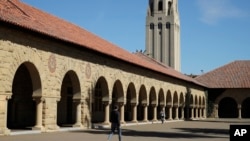
Book your flights right away, get a U.S. phone plan, make sure you have linens for your dorm and attend orientation – that’s some of the advice international students have for first-year college students coming from abroad.
U.S. News & World Report compiled helpful tips for students studying in the United States for the first time. (July 2024)
Survey: Social integration, career prep are important to international students
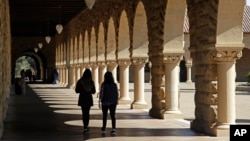
A recent survey of international students in the United States found that before starting school, they were concerned about personal safety, making friends and feeling homesick.
Inside Higher Ed reports that international students want specialized orientations, peer connections, career preparation and job placement to help make their college experiences successful. (July 2024)
US advisory council ends Nigeria visit, signs student exchange deal

Members of a U.S. presidential advisory council have approved a student exchange deal between an American college and a Nigerian university as part of the council's effort to strengthen collaboration on education, health, entrepreneurship and development between Africa and Africans living abroad.
The council also visited a health facility supported by the United States Agency for International Development in the capital.
Nigerian authorities and visitors chatted with members of the U.S President's Advisory Council on African Diaspora Engagement as they toured a healthcare facility in Karu, a suburb of Abuja, on the last day of the council's three-day visit to Abuja and Lagos.
The facility is one of many supported by the United States Agency for International Development, or USAID, to improve the management of childhood illnesses, family planning, immunization and delivery.
The tour was part of the council's effort to promote African diaspora-led investments in technology entrepreneurship, education and healthcare delivery.
"They're doing a phenomenal job there, it really gave us a sense of what the healthcare system is in Nigeria," said Deniece Laurent-Mantey, executive director of the advisory council. "This is our first trip as a council to the continent and we chose Nigeria for a reason — the diaspora in Nigeria is very active, very influential, and they're really a source of strength when it comes to our U.S.-Africa policy. And so for us coming to Nigeria was very intentional."
The council was created by President Joe Biden in September to improve collaboration between Africa and its diaspora in terms of economic and social development.
Akila Udoji, manager of the Primary Healthcare Centre of Karu, said officials in Nigeria were pleased that the council members were able to visit.
"We're happy that they have seen what the money they have given to us to work with has been used to do, because they have been able to assist us in capacity-building, trainings, equipment supply and the makeover of the facility," Udoji said.
Earlier, the council signed a deal for a student exchange program between Spelman College in the southern U.S. city of Atlanta and Nigeria's University of Lagos.
Laurent-Mantey said education exchanges are one of the council's top priorities.
"In Lagos, we had the president of Spelman College — she's also a member of our council — she signed an agreement with the University of Lagos to further education exchange programs in STEM and creative industries between those two universities," Laurent-Mantey said. "And I think for us it's very important, because Spelman College is a historically Black university, and so here we are promoting the importance of collaboration between African Americans and Africans."
In March, the advisory council adopted its first set of recommendations for the U.S. president, including the student exchange initiative, advocating for more U.S. government support for Africa, climate-focused initiatives, and improving U.S. visa access for Africans.
The council met with Nigerian health and foreign affairs officials during the visit before leaving the country on Wednesday.
American Academy of the Arts College announces closure
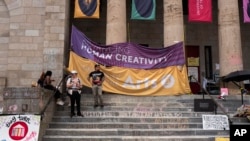
The American Academy of Art College in Chicago announced it would be closing after 101 years of preparing students for careers in art and illustration.
WTTW news reported that like other art colleges, the academy saw enrollment drop after the pandemic, and officials made the decision to close the college last month. (July 2024)
5 killed, dozens injured in clashes over Bangladesh jobs quota system

At least 5 people were killed and dozens injured in two separate incidents in Bangladesh as violence continued Tuesday on university campuses in the nation's capital and elsewhere over a government jobs quota system, local media reports said quoting officials.
At least three of the dead were students and one was a pedestrian, the media reports said. Another man who died in Dhaka remained unidentified.
The deaths were reported Tuesday after overnight violence at a public university near Bangladesh's capital, Dhaka. The violence involved members of a pro-government student body and other students, when police fired tear gas and charged the protesters with batons during the clashes, which spread at Jahangir Nagar University in Savar, outside Dhaka, according to students and authorities.
Protesters have been demanding an end to a quota reserved for family members of veterans who fought in Bangladesh's war of independence in 1971, which allows them to take up 30% of governmental jobs.
They argue that quota appointments are discriminatory and should be merit-based. Some said the current system benefits groups supporting Prime Minister Sheikh Hasina. Some Cabinet ministers criticized the protesters, saying they played on students' emotions.
The Bengali-language Prothom Alo daily newspaper reported that one person died in Dhaka and three others, including a pedestrian, were killed after they suffered injuries during violence in Chattogram, a southeastern district, on Tuesday.
Prothom Alo and other media reports also said that a 22-year-old protester died in the northern district of Rangpur.
Details of the casualties could not be confirmed immediately.
While job opportunities have expanded in Bangladesh's private sector, many find government jobs stable and lucrative. Each year, some 3,000 such jobs open up to nearly 400,000 graduates.
Hasina said Tuesday that war veterans — commonly known as "freedom fighters" — should receive the highest respect for their sacrifice in 1971 regardless of their current political ideologies.
"Abandoning the dream of their own life, leaving behind their families, parents and everything, they joined the war with whatever they had," she said during an event at her office in Dhaka.
Protesters gathered in front of the university's official residence of the vice chancellor early Tuesday when violence broke out. Demonstrators accused the Bangladesh Chhatra League, a student wing of Hasina's ruling Awami League party, of attacking their "peaceful protests." According to local media reports, police and the ruling party-backed student wing attacked the protesters.
But Abdullahil Kafi, a senior police official, told the country's leading English-language newspaper Daily Star that they fired tear gas and "blank rounds" as protesters attacked the police. He said up to 15 police officers were injured.
More than 50 people were treated at Enam Medical College Hospital near Jahangir Nagar University as the violence continued for hours, said Ali Bin Solaiman, a medical officer of the hospital. He said at least 30 of them suffered pellet wounds.
On Monday, violence also spread at Dhaka University, the country's leading public university, as clashes gripped the campus in the capital. More than 100 students were injured in the clashes, police said.
On Tuesday, protesters blocked railways and some highways across the country, and in Dhaka, they halted traffic in many areas as they vowed to continue demonstrating until the demands were met.
Local media said police forces were spread across the capital to safeguard the peace.
Swapon, a protester and student at Dhaka University who gave only his first name, said they want the "rational reformation of the quota scheme." He said that after studying for six years, if he can't find a job, "it will cause me and my family to suffer."
Protesters say they are apolitical, but leaders of the ruling parties accused the opposition of using the demonstrations for political gains.
A ruling party-backed student activist, who refused to give his name, told The Associated Press that the protesters with the help of "goons" of the opposition's Bangladesh Nationalist Party and Jamaat-e-Islami party vandalized their rooms at the student dormitories near the Curzon Hall of Dhaka University.
The family-of-the-veterans quota system was halted following a court order after mass student protests in 2018. But last month, Bangladesh's High Court nulled the decision to reinstate the system once more, angering scores of students and triggering protests.
Last week, the Supreme Court suspended the High Court's order for four weeks and the chief justice asked protesting students to return to their classes, saying the court would issue a decision in four weeks.
However, the protests have continued daily, halting traffic in Dhaka.
The quota system also reserves government jobs for women, disabled people and ethnic minority groups, but students have protested against only the veterans system.
Hasina maintained power in an election in January that was again boycotted by the country's main opposition party and its allies due to Hasina's refusal to step down and hand over power to a caretaker government to oversee the election.
Her party favors keeping the quota for the families of the 1971 war heroes after her Awami League party, under the leadership of her father, Sheikh Mujibur Rahman, led the independence war with the help of India. Rahman was assassinated along with most of his family members in a military coup in 1975.




